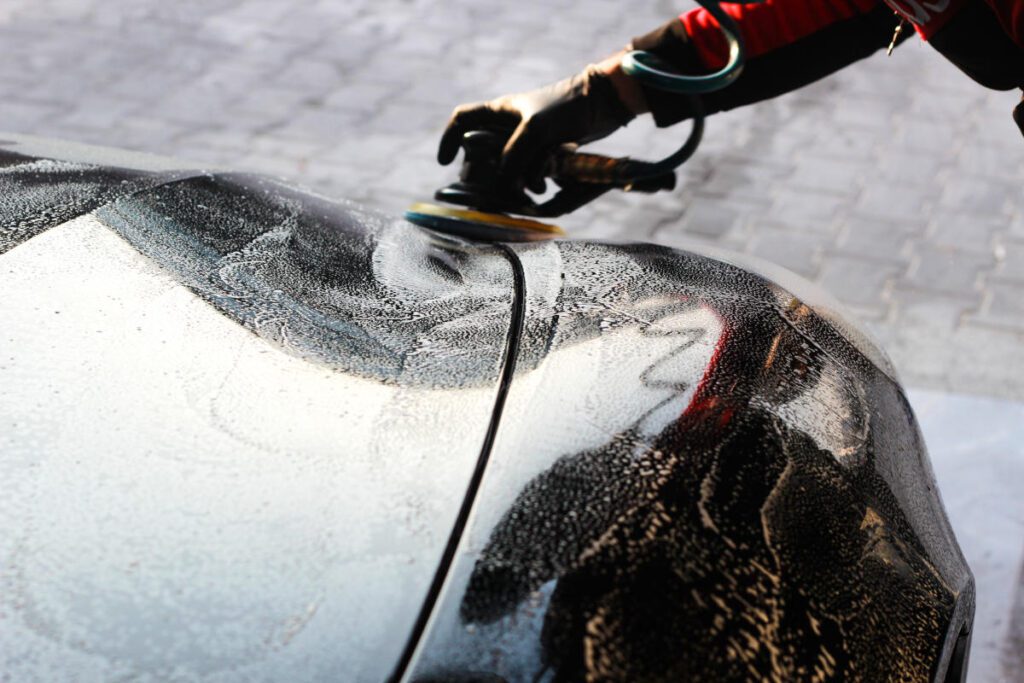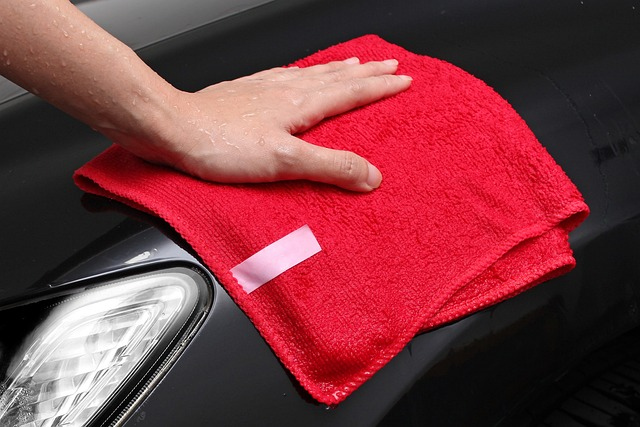Whether you’re a car enthusiast who loves to keep your vehicle looking pristine or someone who just wants to keep their car in good condition, choosing the right car polish is important. Factors such as cost, quality, suitability for your paint finish, and ease of getting a good finish should all be taken into account when making such an important decision.

In this blog, I’ll go over the different types of car polishes commonly available. As well as what factors you should consider before making your purchase.
THE RESULT YOU WANT FROM THE CAR POLISH
Deciding on the ideal finish for your car can be a daunting task. Think about the kind of results you would like – glossy or matte. Will you use it regularly or just for special occasions? By asking yourself these questions at the very beginning of the process, you are more likely to get the perfect look for your vehicle!
Choosing a car polish is an important step in achieving the result you are aiming for. The type of polish you choose will depend on your goals and the condition of your car’s paint. Different types of car polishes can range from wax polishes to all-in-one solutions.
High-gloss, reflective finish consider choosing a polish that contains abrasives or cutting agents. These can can reduce or remove minor imperfections and scratches from the surface of the paint. Recognise that these types of polishes are typically more aggressive. So they need to be used skilfully. They can help restore shine to dull or faded paint.
On the other hand, if your paintwork is in good condition but just needs a little extra shine, you may want to choose a non-abrasive polish that contains oils or other conditioning agents. These types of polishes are milder and can help enhance the gloss of your paint without removing any material.
In addition to considering the type of polish, it’s also important to consider the application method. Some polishes require buffing or machine polishing, while others can be applied by hand using a microfiber cloth. Choose a method that works best for your skill level and available equipment.
Ultimately, choosing a car polish is about selecting a product that aligns with your goals and helps achieve the desired finish. By considering these factors you can select a polish that meets your needs and helps keep your car looking its best.
Ease of use
When deciding which car polish to purchase for your vehicle, it’s important to consider their level of user-friendliness. Some polishes are easier to use than others, requiring less effort and time to get the perfect finish you seek. Others require more effort and skill to apply than others. Its therefore important to choose a product that aligns with your experience level and available equipment.
If you’re new to polishing or don’t have access to professional-grade equipment, consider choosing a non-abrasive or mildly abrasive polish. These commonly can be applied by hand using a microfiber cloth. They are typically easier to work with and require less effort to achieve good results.

If you’re skilled with polishing and have access to equipment such as a buffing machine, you may want to choose a specialist polish that contains cutting agents. These types of polishes can remove deeper scratches and imperfections but require more skill and care when applied.
It’s also important to consider the drying time of the polish. Some products require longer drying times before they can be wiped off, while others can be removed immediately after application. Select a product that aligns with your schedule. You can factor in enough time for the polish to fully dry before wiping off.
Choosing a car polish relative to its ease of use is about selecting a product that aligns with your experience level, available equipment, and schedule. By taking these factors into account, you can select a polish that meets your needs and helps keep your car looking its best, without causing unnecessary frustration.
The price of car polish
The market for car polishes is wide and varied. There is an array of options to suit every budget. From low-end products with an affordable price tags. To more expensive top-tier offerings. Any car enthusiast can find a product that meets both their needs and their wallet.
For an economical solution, wax-based products and water-based formulas are ideal if you don’t mind putting in some elbow grease.
Higher-end synthetic polishes come at a premium. But they also tend to result in an excellent gloss finish and protection lasting months. Perfect for someone who loves taking care of their ride’s paintwork.
There is also an extensive range in terms of price for polishes. As with most things, some offer value for money whereas others may require more investment due to superior ingredients or results. So no matter your requirements or budget, there’s sure to be a car polish right for you.
paintwork AND CAR POLISH CHOICE
When choosing a car polish, it’s important to consider the type and condition of your vehicle’s paintwork. Different types of paint require different types of polishes. It’s important to choose a product that is compatible with your car’s specific needs.
For a car with a clear coat finish, you may want to choose a non-abrasive or mild abrasive polish. These commonly are designed specifically for use on clear coats. These types of polishes are typically less aggressive and won’t damage the delicate clear coat layer.
For a single-stage paint, without a clear coat layer, consider a more powerful polish. This is more likely to remove deeper scratches and imperfections. It is important to be careful when using these types of polishes. They can also remove material from the paint itself.
It’s also important to consider the condition of your car’s paintwork. For paint in good condition and needing an extra shine, you may want to choose a non-abrasive polish. This is likely to contains a range of oils or other conditioning agents.

With dull or faded paintwork which has minor imperfections such as swirl marks or light scratches, look for a polish that contains cutting agents.
Ultimately, choosing a car polish relative to your vehicle’s paintwork requires careful consideration and research. By choosing a product that suits the type and condition of your car’s paintwork, you can achieve optimal results. Importantly, this must be without causing any unnecessary damage or harm during application.
DIFFERENT polishes
When it comes to taking care of your car, the right polish can make a huge difference. There are several types to choose from – each offering different results depending on your needs.
When choosing a car polish, it’s important to consider the ingredients used in the product. Car polishes can contain both natural and chemical ingredients, each with its benefits and drawbacks.
Natural car polishes are typically made from organic materials such as plant extracts or natural oils. These types of polishes are often preferred by those who want to avoid using harsh chemicals on their cars. Natural polishes can be effective at adding shine and protection to your car’s paintwork. But they may not be as effective at removing scratches or imperfections.
Chemical car polishes, on the other hand, are typically made from synthetic compounds. They are often designed specifically certain finished or specialised jobs. These types of polishes can be more effective at removing scratches and imperfections than natural polishes. But they may also contain harsh chemicals that can damage your car’s paintwork if not used properly.
When choosing a car polish relative to its ingredients, it’s important to consider both effectiveness and safety. Look for products that contain high-quality ingredients that have been tested for safety and efficacy. Read reviews from other users to get an idea of how well the product works. And whether it has caused any damage or harm to their cars.
Ultimately, the choice between natural and chemical car polishes comes down to personal preference and priorities. Regardless of which type of polish you choose, always follow the manufacturer’s instructions carefully and take steps to protect your car’s paintwork during application.
CAR SHAMPOO PAIRING
When choosing a car polish, it’s important to consider whether it pairs well with your car shampoo. Using compatible products can help ensure that you achieve the best possible results and protect your car’s paintwork from damage.
One of the main things to consider is the type of ingredients in both your car shampoo and your car polish. Some shampoos contain harsh chemicals that can strip away protective coatings on your paintwork, making it more vulnerable to damage. If you use a shampoo like this, it’s important to choose a polish that contains high-quality ingredients that can help restore and protect your paintwork.
Similarly, some polishes contain abrasive compounds that can scratch or damage delicate paint finishes. If you use a gentle or pH-neutral shampoo, you’ll want to choose a polish that is also gentle and won’t cause any harm to your paintwork.
Another factor to consider when pairing your car shampoo with polish is the overall cleaning power of both products. If you have a particularly dirty or heavily soiled vehicle, you may need a stronger shampoo and polish combination than if your car is only lightly soiled.
Ultimately, choosing a compatible car polish based on your preferred car shampoo comes down to understanding the specific needs of your vehicle and selecting products that work together effectively. By doing so, you can ensure that your car stays looking great for years to come while also protecting its value.
YOUR CAR CLEANING ROUTINE
Polishing your vehicle is an important part of keeping your vehicle looking great, however, it’s important to know how often you should be, or want to be, polishing your car.
The frequency with which you need to polish your car can depend on several factors, including climate, usage, and parking conditions.
Taking into consideration the paint finish and climate conditions such as humidity, temperature and intensity of sunlight, most experts suggest that you should polish your car at least once every 3-4 months.
In areas with harsh climates or extreme weather conditions, such as high temperatures or heavy rain, cars may require more frequent polishing to maintain their appearance and protect the paintwork from damage.
Similarly, if you use your car for off-roading or other rugged activities that expose it to dirt and debris, you may need to polish it more often than if you primarily use it for commuting on paved roads.

Where you park your car can also impact how often you need to polish it. Cars parked in garages or covered parking lots are generally less exposed to the elements and may require less frequent polishing than cars parked outside in direct sunlight or under trees where they are more likely to be exposed to bird droppings and tree sap.
Personal preferences can also play a role in how often you choose to polish your car. Some people may prefer the look of a freshly polished car and choose to do so frequently regardless of environmental factors, while others may be content with a less polished appearance and only polish their cars when necessary.
Ultimately, when choosing a car polish relative to how often you polish your car, it’s important to consider all of these factors together. Choose a product that is effective at protecting your paintwork from damage while also aligning with your personal preferences and lifestyle needs. And always follow the manufacturer’s instructions carefully for the best results.
Car polishing tools
When it comes to polishing your car at home, there are a few essential tools that you will need to get the job done effectively.
Here are some of the key car polishing tools to consider:
Polishing device
A polishing machine is an electric tool that can help you apply polish to your car’s paintwork quickly and evenly. Look for a high-quality machine with adjustable speed settings and a comfortable grip.
Polishing pads
Polishing pads are specifically designed to work with polishing machines and help distribute the polish evenly across your car’s surface. Look for pads made from high-quality materials that won’t scratch or damage your paintwork.
Microfiber cloths

Microfiber cloths are essential for removing excess polish from your car’s surface. Look for towels made from soft, absorbent materials that won’t scratch or damage your paintwork.
Clay bar
A clay bar is used to remove contaminants such as dirt, dust, and tree sap from your car’s surface before applying polish. This step helps ensure that the polish adheres properly and produces a smooth finish.
Tire shine
Add an extra touch of shine to your tires with a tire shine product designed specifically for cars.
By investing in these key car polishing tools, you can achieve professional-looking results right in your garage or driveway.
The bottom line
Now that you know all about choosing the best car polish for your vehicle, put these tips to good use the next time you’re in the market for a new polish. With so many polishes on the market, it can be hard to decide which one is right for you and your car. However, if you consider the above factors, you’ll be sure to find the perfect polish for your needs.
